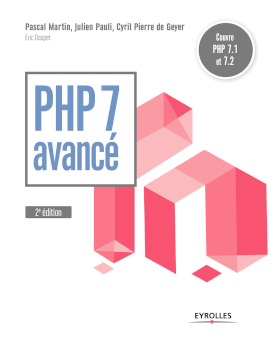PHP 7.1: introduction and release cycle
September 05, 2016 —Cet article est aussi disponible en français.
A new minor version of PHP is just around the corner: PHP 7.1!
Its release date is not really set yet, as it depends on the amount of bugs that will be reported and fixed on Releases Candidates, but it should happen before the end of this year.
One year after PHP 7.0, this first minor release will bring its fair share of new enhancements!
Let’s take a look at those, going with about ten posts spread over the next few days.
Here are those already published:
- PHP 7.1: introduction and releases cycle — this post ;-)
- PHP 7.1: testing a pre-release
- PHP 7.1: enhancements to errors handling
- PHP 7.1: changes to types
- PHP 7.0: new features from the not-so-distant past
- PHP 7.1: better syntax, a more consistent language
- PHP 7.1: create a Closure from a callable
- PHP 7.1: a few other things
- PHP 7.1: actually… No!
- PHP 7.1: the road towards PHP 7.2 and PHP 8.0
- PHP 7.1: a few bc-breaks and conclusion
Regarding the release process
Before really writing about PHP 7.1, new versions of PHP follow this release cycle:
- One new minor release each year — more or less, depending on how long is required to stabilize it.
- Two years of support (bugs + security) for each minor version, counting from its first release.
- One more year of support, for critical security problems only.
PHP 5.6, the last minor release of PHP 5, has seen its active support prolonged until the end of 2016, with fixes for critical security problems until the end of 2018.
PHP 7.0 has been released in December 2015; this means we can expect PHP 7.1 around the end of year 2016. Test releases have already been published this summer, especially with beta 1 in the middle of July and beta 2 at the beginning of August, or even Release Candidate 1 a few days ago.
Minor versions, such as PHP 7**.1**, allow the addition of new features and are supposed not to break backward-compatibility.
PHP evolution gravitates around “RFCs”: when a developer wants to add a feature to PHP, she posts about it on the maintainers’ mailing-list: “internals”. She also writes an RFC: a document describing the change in a structured way. Once it’s been discussed, it can enter a voting phase. These votes decide whether the proposal is accepted or not.
A few useful links:
- The Release Process RFC.
- The list of supported PHP versions, with their end-of-life dates: Supported Versions.
- A list of PHP versions not supported anymore: Unsupported Branches.
- How To Create an RFC and Voting on PHP features.

